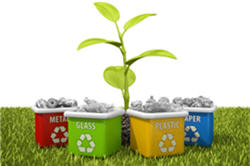Researchers say there is overwhelming evidence that non-therapeutic use of antibiotics contributes to antibiotic resistance.

If you haven’t taken the initiative to recycle – today’s the day to start with Nov. 15 being America Recycles Day (ARD) and all.
Air pollution is changing our environment and undermining many benefits we rely on from wild lands, threatening water purity, food production, and climate stability, according to a team of scientists writing in the Ecological Society of America's Issues in Ecology.
Ancient rocks embedded in the West Antarctic ice sheet could help University scientists improve sea level predictions.
Policies to protect the global climate and limit global temperature rise offer the most effective entry point for achieving energy sustainability, reducing air pollution, and improving energy security, according to an article published in the latest issue of Nature Climate Change.
An analysis of the remains of ancient midges – tiny non-biting insects closely related to mosquitoes – opens a new window on the past with a detailed view of the surprising regional variability that accompanied climate warming during the early Holocene epoch, 10,000 to 5,500 years ago.
Australians have been working hard to cut down their household’s daily water consumption, however a new study in the latest edition of Building Research & Information reveals that clothing, food and electricity are the three biggest culprits for a household’s high water usage.
The National Center for Atmospheric Research (NCAR) has developed a highly detailed wind energy forecasting system with Xcel Energy, enabling the utility to capture energy from turbines far more effectively and at lower cost. The system, which Xcel Energy formally took over last month, saves ratepayers several million dollars yearly.
As part of the Administration’s commitment to ensuring a clean energy future, U.S. Energy Secretary Steven Chu announced that up to $8 million in funding will be made available to encourage utilities, local governments and communities to create programs that empower consumers to better manage their electricity use through improved access to their own electricity consumption data.
Officials from the U.S. Environmental Protection Agency (EPA) and the U.S. General Services Administration (GSA) toured e-Green Management of Islip Terrace, New York to highlight the environmental, public health and economic benefits of recycling electronics.
Tierra Environmental and Industrial Services Inc., a centralized waste treatment facility in East Chicago, Ind., its owner and a manager were charged with conspiracy and felony violations of the Clean Water Act in a seven-count indictment returned by a federal grand jury.
A New York developer and his companies were indicted today on federal charges that they conspired to illegally fill jurisdictional wetlands.
Nobel Prize winner George Olah and Surya Prakash of USC Dornsife have found new traction in their methanol economy concept with their latest publication, the Open Fuel Standard Act of 2011, and the new discoveries of shale gas.
Preliminary findings from a study on the use of hydraulic fracturing in shale gas development suggest no direct link to reports of groundwater contamination, according to the project leader at The University of Texas at Austin’s Energy Institute.
American energy use went back up in 2010 compared to 2009, when consumption was at a 12-year low.

An international team of researchers funded by NASA and the National Science Foundation (NSF) will travel next month to one of Antarctica's most active, remote and harsh spots to determine how changes in the waters circulating under an active ice sheet are causing a glacier to accelerate and drain into the sea.
Without a bold change of policy direction, the world will lock itself into an insecure, inefficient and high-carbon energy system, the International Energy Agency (IEA) warned as it launched the 2011 edition of the World Energy Outlook (WEO). The agency's flagship publication, released today in London, said there is still time to act, but the window of opportunity is closing.
Kawasaki Disease (KD) is a severe childhood disease that many parents, even some doctors, mistake for an inconsequential viral infection. In fact, if not diagnosed or treated in time, it can lead to irreversible heart damage. After 50 years of research, including genetic studies, scientists have been unable to pinpoint the cause of the disease.
The U.S. Environmental Protection Agency (EPA) issued the first Texas Greenhouse Gas (GHG) permit for the Lower Colorado River Authority (LCRA) Thomas C. Ferguson Power Plant in Llano County, Texas.